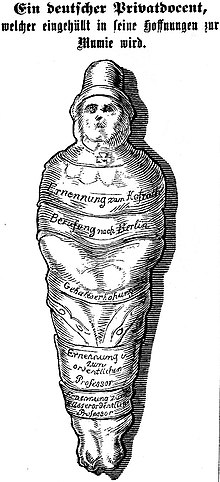An academic degree is a qualification awarded to a student upon successful completion of a course of study in higher education, usually at a college or university. These institutions often offer degrees at various levels, usually divided into undergraduate and postgraduate degrees. The most common undergraduate degree is the bachelor's degree, although some educational systems offer lower-level undergraduate degrees such as associate and foundation degrees. Common postgraduate degrees include engineer's degrees, master's degrees and doctorates.

A doctorate or doctoral degree is a postgraduate academic degree awarded by universities and some other educational institutions, derived from the ancient formalism licentia docendi.
Habilitation is the highest university degree, or the procedure by which it is achieved, in many European and non-English-speaking countries. The candidate fulfills a university's set criteria of excellence in research, teaching, and further education, which usually includes a dissertation. The degree, sometimes abbreviated Dr. habil., PD, or D.Sc., is often a qualification for full professorship in those countries. The degree conferral is usually accompanied by a public oral defence event with one or more opponents. Habilitation is usually awarded 5–15 years after a PhD degree or its equivalent. Although in some countries Doctor of Sciences degree correlates with a position of Docent, it is closer in practice to the position of a full professor in the US.
A Doctor of Science is a science doctorate awarded in a number of countries throughout the world. In some countries, a Doctor of Science is the degree used for the standard doctorate in the sciences; elsewhere a Doctor of Science is a "higher doctorate" awarded in recognition of a substantial and sustained contribution to scientific knowledge beyond that required for a Doctor of Philosophy (PhD).
The title of docent is conferred by some European universities to denote a specific academic appointment within a set structure of academic ranks at or below the full professor rank, similar to a British readership, a French maître de conférences (MCF), and equal to or above the title of associate professor.
Tenure is a category of academic appointment existing in some countries. A tenured post is an indefinite academic appointment that can be terminated only for cause or under extraordinary circumstances, such as financial exigency or program discontinuation. Tenure is a means of defending the principle of academic freedom, which holds that it is beneficial for society in the long run if scholars are free to hold and examine a variety of views.
Honorary titles in academia may be conferred on persons in recognition of contributions by a non-employee or by an employee beyond regular duties. This practice primarily exists in the UK and Germany, as well as in many of the universities and colleges of the United States, Australia, Hong Kong, Taiwan, China, New Zealand, Japan, Denmark, and Canada.

Doctor of Sciences is a higher doctoral degree in the Russian Empire, Soviet Union and many post-Soviet countries, which may be earned after the Candidate of Sciences.

Professor is an academic rank at universities and other post-secondary education and research institutions in most countries. Literally, professor derives from Latin as a "person who professes". Professors are usually experts in their field and teachers of the highest rank.
This article describes the academic positions and ranks in Sweden.

A Doctor of Law is a doctorate in legal studies.
Academic staff, also known as faculty or academics, are vague terms that describe teachers or research staff of a school, college, university or research institute.
The following are academic ranks in the Finnish higher education system. There are a specific number of posts, which can be applied to when they are vacated or established.
Academic ranks in Germany are the titles, relative importance and power of professors, researchers, and administrative personnel held in academia.
Academic ranks in Hungary are the titles, relative importance and power of professors, researchers, and administrative personnel held in academia.
Academic ranks in Norway are the system of merit-based ranks used by academic employees in academia. Similar to the British rank system, the Norwegian rank system is broadly divided into three pathways, a combined research and teaching career pathway, a research career pathway and a teaching career pathway.
Academic ranks in Kenya are the titles, relative importance and power of professors, researchers, and administrative personnel held in academia.
Academic ranks in Colombia are the titles, relative importance and power of professors, researchers, and administrative personnel held in academia.
Wissenschaftlicher Assistent, often shortened to Assistent, literally "scientific assistant", is an academic position at German universities for researchers with doctoral degrees and additional academic qualifications, who are typically employed to conduct research to qualify themselves for the Habilitation and thus a full professorship.




